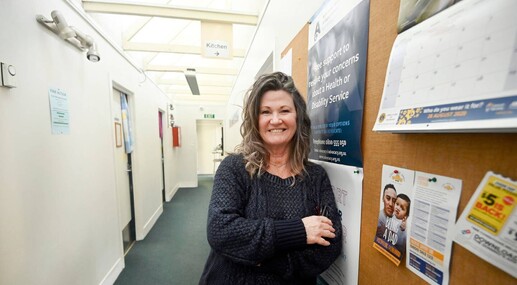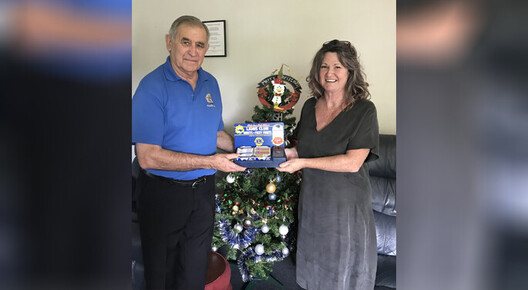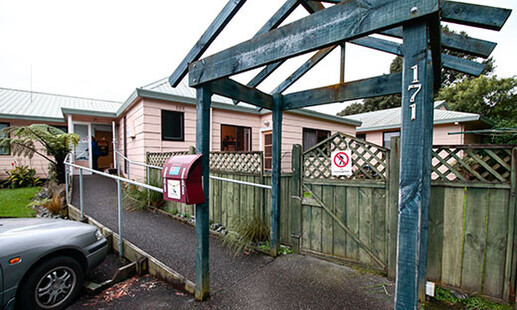Tauranga’s Takitimu House supports homeless men to rebuild
October 27, 2020
The Takitimu House nightshelter based in Tauranga helps rebuild homeless men’s lives by transitioning them back into society. They’ve helped at least 20 families since Covid-19 and have relied on community donations to help furnish their homes.
Record number of Tauranga men's nightshelter clients housed
August 12, 2020
"Wow, this is actually mine." Walking through his new home for the first time last week, Ross, who only wants to be known by his first name, is apprehensive and lost for words. "It's the first time I've had a house of my own ... it was a very special moment."
Ross had been on the streets for 25 years before walking through the doors of Takitimu House three months ago. He is the youngest of 14 children and when his parents died, he ended up on the streets. The following years were spent sliding into darkness through violence, addiction, and time behind bars.
"I found myself at the bottom of the gutter." His childhood traumas hung over him, which began with an abusive family home. "My father was exactly like Jake the Muss from Once Were Warriors."
While homeless, his nights would be spent with his head on a rock, and he did not realise he did not have to be cold all the time. "I couldn't see a light at the end of my tunnel."
But he now sits with shelter manager Annamarie Angus in a neat brown jersey, socks pulled up mid-shin, his shoulders relaxed and a twinkle in his eyes.
He is one of 10 men who were supported into housing by the shelter in a record month last month. The men went to a range of accommodation types - private rentals, social housing and rest homes.
Within a few days of being at the shelter, Ross noticed a shift in his mindset. A sense of community and belonging is an important aspect in the healing of the men.
The three months were difficult but the support from staff, other men, and the multiple wrap-around services and programmes kept him going. "I can see my children being with me, I can see happiness which wasn't there before, I can see them growing to love me as a father."
This week, he starts his construction job in Omokoroa.
Angus sat back and smiled listening to him speak of his journey and said people came through at "different stages of readiness". While Ross worked through his issues and was housed within three months, another man who was housed last month had been with the shelter for three years.
"They need to recover and they need to rebuild before any of them are able to be housed," which depended on how ready they were to work through their trauma. The complications men arrived with varied, including generational and systemic trauma, discrimination, and disconnection from family, whānau, and society in general, she said.
Other challenges were poverty, significant mental and physical health problems, phenomenal debt, detrimental tenancy histories, criminal backgrounds and substance abuse. Some had no identification, no doctor, no bank account. On top of this; some felt anger, a sense of loss, hopelessness, and defeat.
"Our people would still feel like they are teetering on the edge of society with no real meaning to their lives, even with a roof over their heads," Angus said.
Psychologist David Chaplow had worked with the shelter for a number of years. He had facilitated the physical and mental assessment of some of the homeless. Chaplow said with the extensive issues that needed addressing, the wrap-around services at Takitimu had set a high benchmark.
With 4000 people identified as homeless in the Western Bay of Plenty by the Mayoral Taskforce, Angus said as a society, the issues had been left too long, and there was no quick fix.
There were specifically designed programmes held on-site, most of which were comprised of grassroots therapeutic value such as the Wakaunua Whaihauora Programme and Kei hea Koe Wananga.
Other services dealt with practical issues such as budgeting, meaningful activities, work, or volunteer work.
Housing providers, mental and physical health providers, counselling services, corrections and justice, Whānau Ora, Kaupapa Māori Services, iwi, hapū, and members of the community include those making the extended team.
"Many of our people will not or have not been accepted into services outside of the shelter, or service delivery has not been timely, flexible, or personal enough. "Jumping through hoops is soul-destroying. The men have jumped these hoops most of their lives and to date have had little success."
Housing, while it was a goal, was not the main priority, Angus explained, with stability, health, reconnection, independence, a sense of wellbeing, and worthiness the key focuses. There was structure, routine, expectations, and rules which kept the house a place where people could find calm and reflection.
It is through the shelter's wānanga and consistent awhi that Angus said best prepared the men for a life of independence.
"A holistic approach in its truest form achieves successful transformations of lives that have been broken." The men continued to be supported after leaving the shelter, and Angus said it would be at least once a week in the initial stages of the transition.
Many continued to come back to the shelter, staying engaged in the support programmes. Kei hea Koe Wānanga alone had been "transformational" in terms of addressing trauma which had "taken our men's recovery and wairua to an entirely new level".
There was an in-house assessment and referral process that allowed individuals to create, evaluate, and reach their goals. "It's vital to get it right the first time... our people's most basic needs have not been met in the past, this doesn't happen on our watch."
"Housing is the icing on the cake... it's a huge deal to see these men transform their lives." Accessible Properties Tauranga had 1160 properties in Tauranga, Mount Maunganui, Papamoa and Te Puke and focused on working with individuals and families.
General manager Vicki McLaren said the work was a collaborative approach to matching the limited housing stock "to the avalanche of need we are facing". "We have a welfare system struggling to deal with big social challenges that it was never designed for." McLaren said being able to support the men in rebuilding their lives were "mini-miracles".
Trustee Vicki Scott said the unconditional support was something some of the men had never experienced. "It's not enough to dump people into accommodation without intensive wrap around awhi." "Our Annamarie is a modern day Mother Teresa."
Meanwhile, back at Ross' place, he's excited to begin his new job and plans to keep his house neat and tidy.
Tauranga homeless get a helping hand from Lions
December 10, 2019
Homeless men will be able to transition into a permanent home easier thanks to a donation from the Otumoetai Lions Club. Tauranga Moana Nightshelter Trust manager Annamarie Angus says the $584 donation will go into a pool of money for items needed when housing people.
“We try to access everything that we can, generally from a very generous community, but there's often things that we can't get or things that we need to organise that it's really good to have a little bit of funds for. “It just helps us kick start our guys off in their new home in a really positive way.”
Annamarie say the funds can go towards something as small as a mop and bucket, a vacuum or bond for a new tenancy.
Takitimu House is the men’s shelter that acts as a first port of call for men to access the trust’s services. “We work with men from the age of 17 and we work with them holistically around all of their needs.
“The priority is keeping them off the street and stabilising them and whatever issues they may present with, whether that be drug and alcohol or mental health and engaging any other service that we need to. So once they are quite stable and all the supports are in place, then our goal is to house them but with a 100 per cent likelihood of success."
"We don't want to see our people keep turning over tenancies. We want to see happy tenants, happy landlords, and a happy community.”
Annamarie says the shelter isn’t a typical shelter. “The shelter is like a house, it's like your house and mine. We have pets, we have fish. It’s a very different, humbling environment to work within. “It's not a shelter, it’s everything that they would need.”
She says the have often received support from different Lions Clubs around the region since they started five years ago. “It's really amazing that people like the Lions club still remember us and remember to think about our clients.”
Tauranga men's shelter Takitimu House rebuilds hundreds of lives
October 6, 2019
The doors at Takitimu House were thrust open to Tauranga's homeless men five years ago, becoming a beacon of hope for a portion of the community previously shunned and left out in the cold.
Peter Walsh's music and IT diplomas are proudly hung on his lounge walls, but his biggest triumph is the roof over his head. Last year, the 55-year-old was homeless. Walsh, who was battling prostate cancer, found himself on the street after accumulating too much debt as a student. He had got behind in rent and was kicked out of his flat. "I pushed my finances to the limit," he said.
The former fitter-welder slept on other people's couches before seeking help at Takitimu House, formerly known as the Tauranga Moana Men's Night Shelter. Walsh's stay at the homeless shelter is among 1668 visits since it opened five years ago. He is also one of 53 men who found a home to live in last year.
Walsh admits it was challenging adjusting to the house rules, which included waking at 6am for breakfast and chores before fitting in counselling, budgeting courses, job searching and health and nutrition programmes. Now he is on a sickness benefit and has settled into his own home provided by Accessible Housing.
"But I don't know where I'd be today otherwise. I am in debt to these people, eternally." Takitimu House manager Annamarie Angus said witnessing the transformation of men's lives was rewarding. Angus said the biggest misconception around homeless men was they "should just get a job" but their unresolved trauma, often from a young age, affected their ability to work. "These people have been looked down on, trod on and ignored for the best part of their lives. They need to learn to trust again and learn what it means to be a part of our society again. "I challenge anyone to give up their homes and carry on with their jobs. Give away all of your ID, lose everything. Accompany that with a bit of trauma then find your way."
Angus said getting men help from social agencies such as the Ministry of Social Development was challenging as many men had been in and out of services their whole lives. In-depth treatment and support were needed to resolve the horrific trauma some men had experienced, she said. "The damage is caused over many years and we will always need to look after this group," she said.
"We will keep walking alongside them until they feel strong enough to manage on their own." A little more than 100 men visited the homeless shelter when it first opened in 2014. Last year, there were more than 500, including repeat visitors.
Lance Wilson used to live on the streets and now his home is at Takitimu House. His job is the house supervisor. Wilson said his experience on the street meant he brought more empathy to the role and he was rewarded by seeing people reach a place where they could move forward with their lives. "I've walked in their shoes," he said.
Former board member Michael Mills said the shelter had fulfilled the vision of providing support and advocacy for homeless men in the past five years. But he said the Tauranga Moana Men's Night Shelter Trust needed a new purpose-built facility in the city as the current site was on a floodplain.
Acting chairman of the trust, Brent Gilbert-De Rios, said now the shelter had reached its five-year milestone, it now needed to focus on filling any gaps in the needs of the city's homeless men.
Five years of Takitimu House
- The shelter officially opened on September 9, 2014.
- Number of men through the doors - includes repeat visitors
2014: 105
2015: 299
2016: 437
2017: 315
2018: 512 - About 55 men have been helped into housing each year.
- It offers nursing clinics, financial literacy, Man Up programme, life skills, drug and alcohol courses through the Hanmer Clinic, trauma counselling, and mirimiri.
$25K to Help Bay Homeless
May 27, 2016
A $25,000 grant from BayTrust is being warmly welcomed by Tauranga Moana Night Shelter Trust in response to the Bay’s current housing crisis placing huge strain on social agencies.
Tauranga Moana Night Shelter manager Annamarie Angus says staff and volunteers are committed to helping each man end the cycle of homelessness by resolving long-term issues such as access to health services, social welfare benefits, and drug and alcohol counselling.
“Without BayTrust’s help we wouldn’t be able to provide these services. We would just become another warehouse night shelter where people come in at 4pm and leave again at 7.30am and nothing else gets resolved,” says Annamarie.
The night shelter opened on Elizabeth St in September 2014 and offers more than just a safe place to sleep.
“With the right supports in place, housing becomes sustainable for the long-term. Most people do want that – they are looking to live well in the community and have their own whare to go home to.”
BayTrust chief executive Alastair Rhodes says the $25,000 grant towards the night shelter’s operational costs will help further BayTrust’s vision of ensuring “the Bay of Plenty is the greatest place to be”.






